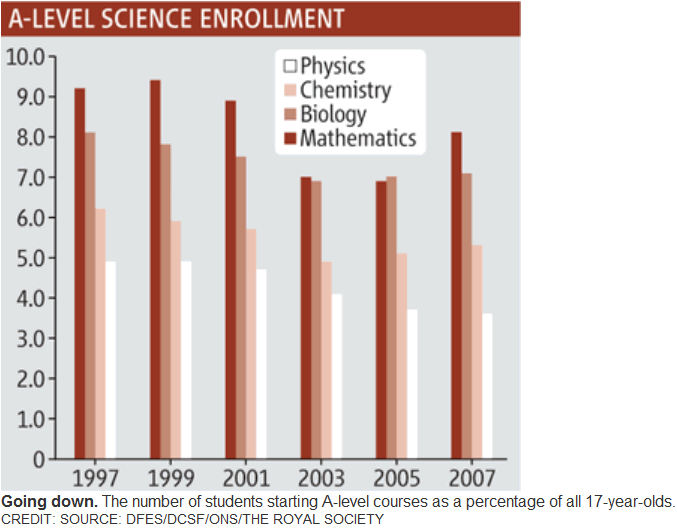|
|
|
|
|
|
|
News & Views item - September 2008 |
![]() Royal Society Lashes UK Pollies for Poor Science/Maths Education Policies.
(September 6, 2008)
Royal Society Lashes UK Pollies for Poor Science/Maths Education Policies.
(September 6, 2008)
A major new report on science and maths education published by the Royal Society yesterday is highly critical of governmental policies.
According to the 'State of the Nation' report "major educational reforms over the last 12 years have had worryingly little impact on increasing the number of students taking maths and science in post-compulsory education... In England, Northern Ireland and Wales no more than 6 per cent of 17 year olds took an A-level in physics in any one year. For chemistry the figure was 7 per cent and for biology and mathematics it was 12 per cent".
Professor Michael Reiss, Director of Education at the Royal Society, said:
Science and mathematics education, particularly in England, has been assaulted by reform over the last 20 years. Recently there have been encouraging signs that more young people are choosing to study the sciences and mathematics after the age of 16, but the longer term trend exposes the failure of the many changes to make enough of a difference.
Unless we break the cycle of politically motivated, knee jerk reactions and constant change we are in danger of never giving reforms the time they need to bed-in and therefore not getting to grips with what works and what doesn't.
To ensure that education reform is driven by the needs of education rather than the sometimes short-term agendas of politicians there is clearly a need for a fully independent body responsible for curriculum reform in each of the UK nations.
We cannot expect major curriculum initiatives to succeed unless they are based on the best evidence and properly piloted.
Lessons can be learned from the experiences of the different UK countries. In Scotland the proportion of students taking science and maths Highers is much higher than students taking A-levels in England, Northern Ireland and Wales. This is partly because of the broader curriculum but may also be related to a stronger tradition of teaching the sciences separately and the fact that the great majority of science teachers are specialists in one of the sciences.

Professor Dame Julia Higgins, Chair of the report's working group, said:
A high quality education in science and maths is central to sustaining a thriving economy. Unfortunately our report shows that education in the UK is failing to provide the increases in the numbers of school leavers with the qualifications in these subjects required by industry, business and the research community to assure the UK's future economic competitiveness.
Whether or not Australia's federal minister for education, together with her state ministerial counterparts, will take note of the Royal Society's evaluation and consider it locally pertinent is a moot question.